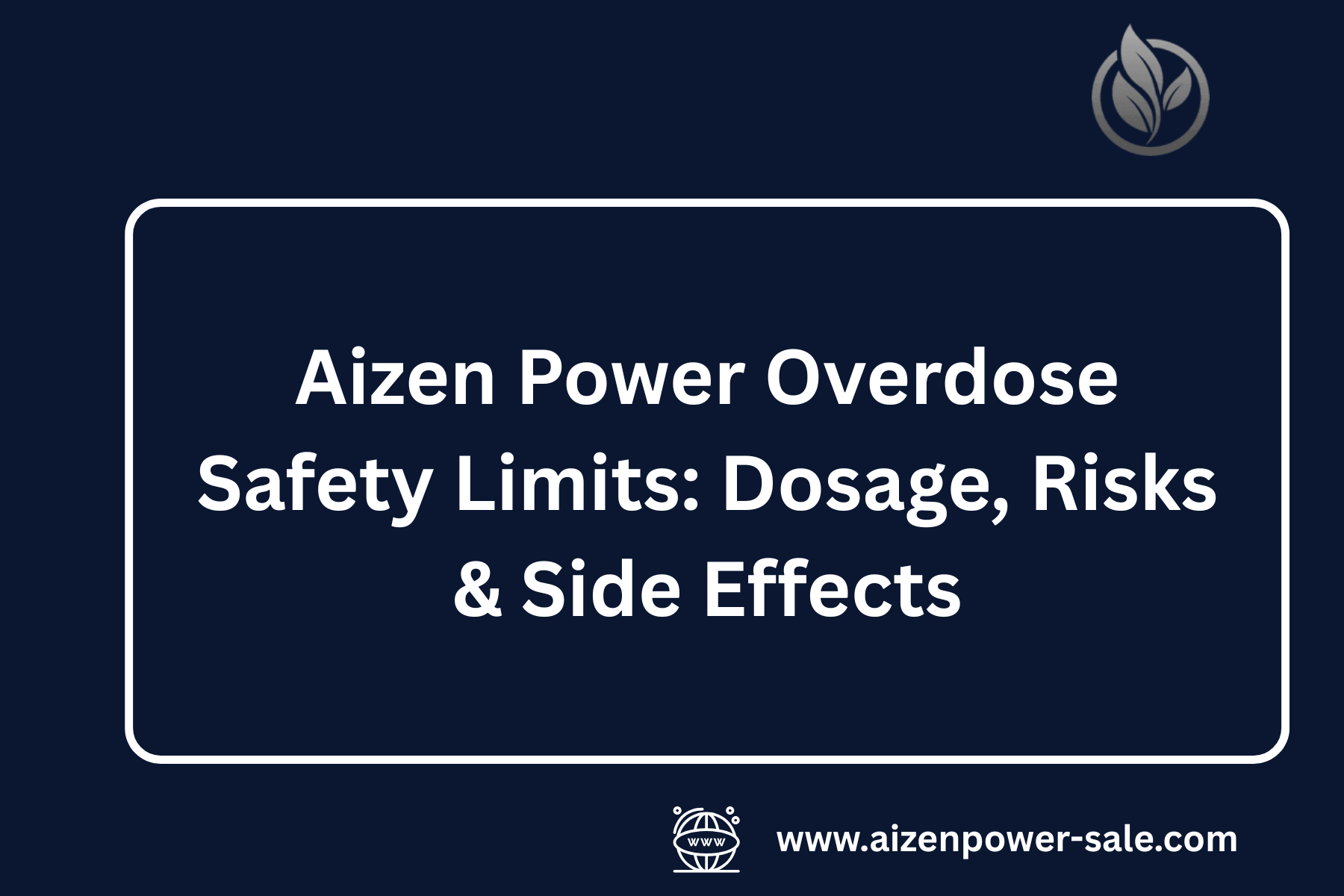Aizen Power overdose safety limits are a major concern for consumers using this herbal supplement for men’s health. Like many unregulated formulas, the risks of exceeding dosage remain unclear. People often ask about the recommended dosage, possible side effects, and when to seek doctor’s advice. Understanding safe intake levels is essential because going beyond the suggested amount can cause serious health complications. This article explains dosage guidelines, overdose symptoms, manufacturer warnings, and medical recommendations.
What is the safe dosage of Aizen Power?
The safe dosage of Aizen Power is the amount stated on the product label. Manufacturers typically recommend 1–2 capsules daily with water. Exceeding this intake increases the risk of adverse health effects due to concentrated herbal compounds.
- Form: capsule
- Recommended intake: 1–2 per day
- Administration: after meals, with water
Consumers should follow usage instructions closely.
What happens if you overdose on Aizen Power?
Overdosing on Aizen Power causes digestive distress, nausea, headache, and dizziness. In severe cases, excessive intake may trigger toxic liver strain or cardiovascular stress depending on ingredient concentration.
| Symptom type | Common effects | Severe risks |
|---|---|---|
| Digestive | Nausea, cramps | Persistent vomiting |
| Neurological | Headache, dizziness | Confusion, fainting |
| Systemic | Fatigue | Organ stress |
Are there official safety limits for Aizen Power?
No official safety limits exist for Aizen Power because the supplement is not FDA-approved or tightly regulated. Safety thresholds depend on individual tolerance, body weight, and underlying conditions. Consumers face higher risks when exceeding label recommendations.
What side effects occur from excessive use?
Excessive use of Aizen Power may cause:
- Mild: stomach upset, bloating, insomnia
- Moderate: rapid heartbeat, high blood pressure
- Severe: liver toxicity, kidney strain, allergic reactions
Side effect severity increases when combining the supplement with alcohol, stimulants, or prescription drugs.
Should you consult a doctor before use?
Yes, doctors advise consultation before taking Aizen Power, especially for consumers with:
- Chronic illnesses (diabetes, hypertension, heart disease)
- Medication use (blood thinners, antidepressants)
- Pregnancy or breastfeeding
Doctors can check ingredient interactions, monitor tolerance, and prescribe safer alternatives if needed.
What do manufacturer warnings say about Aizen Power?
Manufacturers provide dosage guidelines and warnings on labels. Typical warnings include:
- Do not exceed recommended dose
- Not suitable for children under 18
- Avoid if pregnant or nursing
- Consult a doctor before combining with medication
Labels protect consumers, but enforcement of claims is limited due to supplement regulation gaps.
How do ingredients affect body tolerance?
Aizen Power contains herbal extracts, vitamins, and natural compounds. Tolerance depends on:
- Ingredient potency – high concentration increases risk
- Consumer health status – liver or kidney issues lower tolerance
- Usage duration – prolonged use increases side effect probability
Consumers should monitor for early warning symptoms when starting supplementation.
Can Aizen Power be combined with other supplements?
Combining Aizen Power with other supplements increases risk of overlapping ingredients or toxic buildup. For example:
- Ginseng + Aizen Power → overstimulation
- Green tea extract + Aizen Power → high caffeine intake
- Vitamin blends + Aizen Power → fat-soluble vitamin overdose
Doctors recommend avoiding unregulated stacking.
What overdose symptoms require medical attention?
Seek urgent care if overdose causes:
- Severe abdominal pain
- Difficulty breathing
- Rapid or irregular heartbeat
- Swelling or rash (allergic reaction)
- Persistent vomiting or confusion
Medical professionals may perform blood tests, liver panels, or cardiovascular monitoring.
Key safety recommendations for consumers
- Check labels for dosage guidelines
- Follow safe limits and never exceed them
- Consult doctors before first-time use
- Monitor symptoms during prolonged intake
- Avoid combinations with similar herbal supplements
These steps reduce the risk of serious overdose complications.
FAQ on Aizen Power Overdose Safety Limits
What is the maximum safe dosage of Aizen Power?
The maximum safe dosage is the amount stated on the label, usually 1–2 capsules daily. Exceeding this may increase health risks.
Can you overdose on Aizen Power?
Yes, overdosing is possible. It can cause nausea, dizziness, headache, and in severe cases, organ stress.
Are there official safety limits for Aizen Power?
No, official safety limits are not established. The supplement is not FDA-approved or strictly regulated.
What are the symptoms of an Aizen Power overdose?
Overdose symptoms include stomach upset, rapid heartbeat, dizziness, and fatigue. Severe cases may involve liver or kidney strain.
Should you consult a doctor before taking Aizen Power?
Yes, especially if you have chronic illness, take medications, or are pregnant or breastfeeding.
What do manufacturer warnings say?
Manufacturers warn against exceeding dosage, using during pregnancy, or combining with certain medications.
Can Aizen Power be combined with other supplements?
Combining it with other supplements may cause excessive stimulant or vitamin intake. Doctors recommend caution.
When should you seek medical help for overdose?
Seek care if you experience chest pain, severe abdominal cramps, breathing difficulty, or persistent vomiting.
Conclusion
Aizen Power may seem like a natural solution, but dosage control and safety monitoring are essential. Overdose can cause digestive, neurological, and systemic risks, especially when combined with other supplements or medications. Manufacturer labels provide guidance, yet medical consultation remains the most reliable safeguard. Consumers who respect safety limits, follow usage recommendations, and monitor symptoms reduce their risk of severe side effects.
